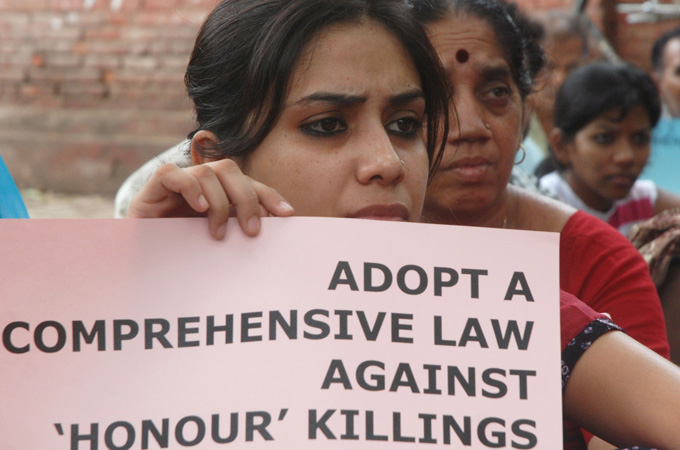 |
| "It is difficult to get the actual number of 'honour killings', as they are often disguised as accidents or suicides." (EPA) |
By Chaitra Arjunpuri
Aljazeera.com, December 27, 2012
"The policeman jumped to his feet as the man walked into the station and placed the head of his sister, along with the butcher knife that decapitated her, on the table in front of him. The incident in Kolkata on December 7 was another killing in the name of 'honour' and there has been a surge in such attacks over the past several months. Nilofar Bibi, 22, was only 14 years old when she left home in an arranged marriage. Alleging torture carried out by her in-laws, Bibi returned to her parents on November 28, but vanished days later. Her brother, Mehtab Alam, 29, had discovered his sister was living with an old boyfriend, Firoz, an auto-rickshaw driver. Alam stormed into the home and dragged Bibi onto the street in broad daylight. Passers-by looked on in horror as he cut off Bibi's head while saying 'she had sinned and had to be punished'. Alam left his sister's body in a pool of blood on the road, and calmly walked to the police station, her head in hand, to surrender himself. The siblings' family expressed support for Alam, saying they were proud he upheld their honour. In a country currently caught up in collective outrage over a gang rape of a medical student in New Delhi, Bibi's killing registered only a passing reference in the national media. But the coverage -- or the lack of it -- failed to hide the true extent of a scourge that bedevils many Indian women.
In a similar incident, a 17-year-old girl, a resident of Khoraon village, Kaushambi in Uttar Pradesh, was hacked to death by her father for having an affair with a 20-year-old from another religion from the same village, on December 24. In the south, a 19-year-old woman in Sangameshwar village in Dharward, Karnataka, was allegedly killed and burnt by her parents on December 23. 'Honour killings' are traditionally associated with developing countries with significant Muslim populations, and India has been no exception. 'Killing is killing. It is unconstitutional and illegal, it's an offence. There is no "honour" in killing,' Nirmala Samant Prabhavalkar, a member of India's National Commission for Women (NCW), told Al Jazeera. Madhu Purnima Kishwar, founder of women's rights organisation Manushi, told Al Jazeera part of the problem is the language used to describe murder by family members, with women most often the victims. The term 'honour killing' is meant to make the crime appear exotic, as something that happens only in the 'uncivilised' non-Western societies, Kishwar said. 'For example, when a jealous husband murders his wife in New York because he suspects her of having an affair, no one calls it "jealousy murder". In fact, that also could well be called an "honour killing",' said Kishwar. She said the legal systems in many countries take a lenient view of such killings and treat them as 'less serious' or 'more justified' than other murders. Filmmaker Jean Claude Codsi recently screened his movie A Man of Honor at the Cairo International Film Festival. He noted it is hard to get actual figures on the number of such murders globally. 'It is very difficult to work out the magnitude and number of the "honour killings", as they are often disguised as accidents or suicides,' said Codsi. He told Al Jazeera sexual deviance in families sometimes plays a role in the violence. 'Often there are dark tales of incest behind the killings,' Codsi said. A 2000 United Nations study estimated there are more than 5,000 'honour killings' worldwide each year. The National Commission for Women in India said it investigates 70-80 possible cases a month. [...]"
No comments:
Post a Comment